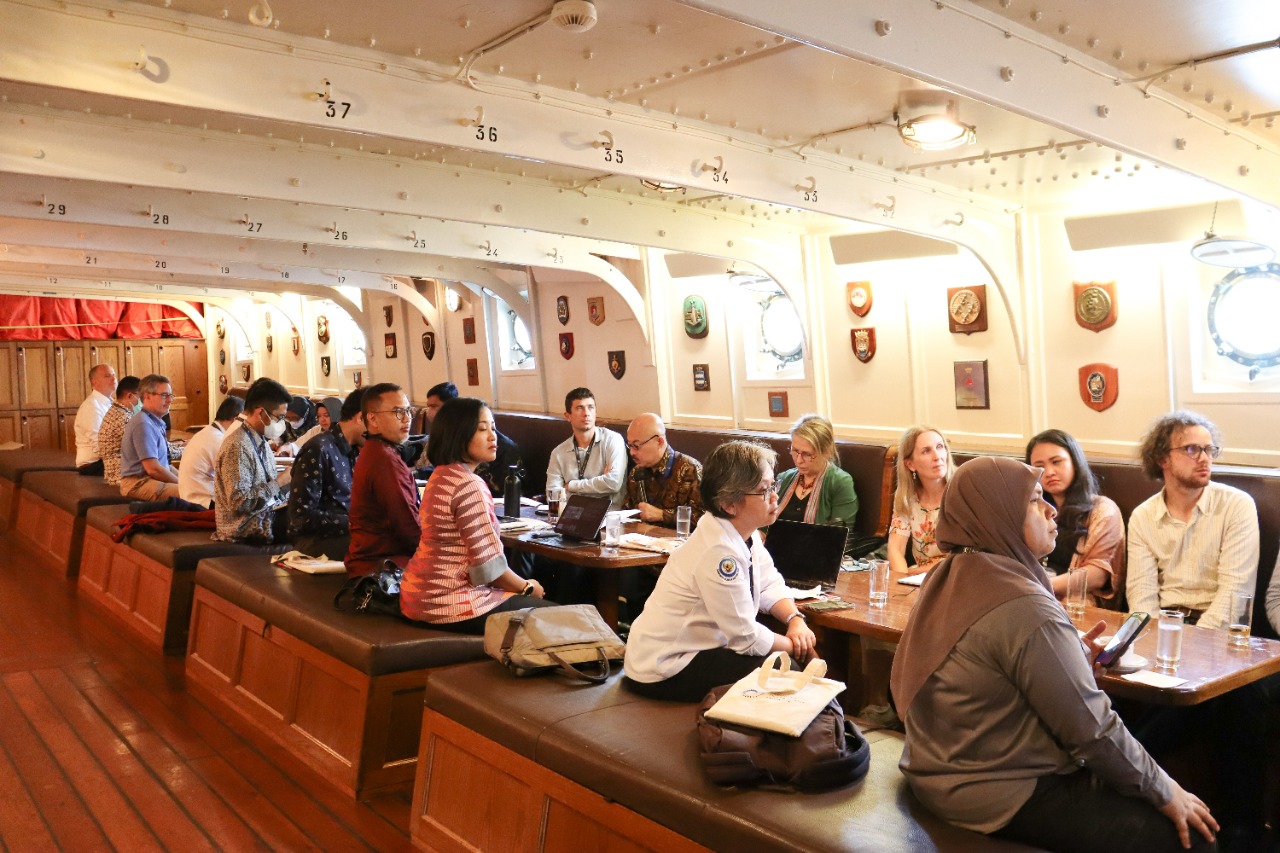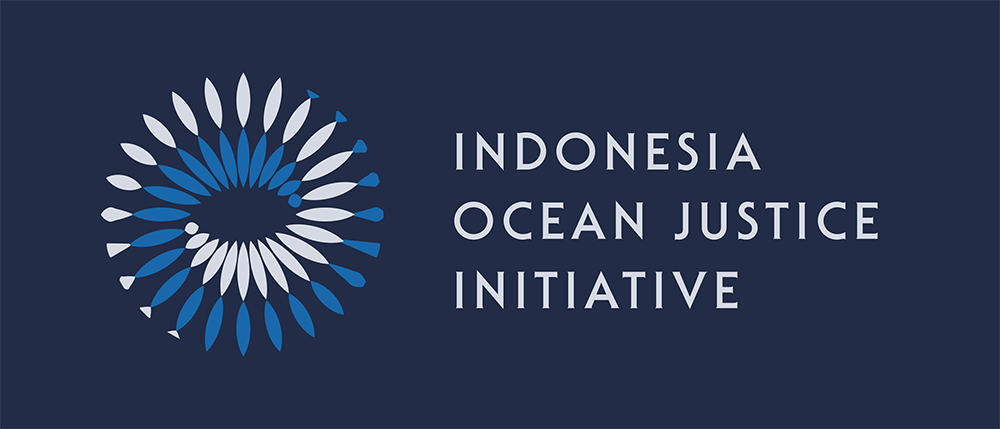Roundtable Discussion onboard Statsraad Lehmkuhl : Towards a Sustainable and Equitable Ocean Economy
 Jakarta – Monday, November 7, 2022 – The Royal Norwegian Embassy in partnership with Indonesia Ocean Justice Initiative (IOJI) organized a roundtable discussion on sustainable ocean economy. The discussion was held onboard the Norwegian tall ship, Statsraad Lehmkuhl, visiting Tanjung Priok Port from 6 to 9 November 2022 as part of the One Ocean Expedition. The discussion focused on two of the five key transformation areas towards sustainable ocean economy, namely ocean health and ocean equity (in addition to ocean wealth, ocean knowledge, and ocean finance). Representatives from the government, academia, and civil society organizations shared their views on progress, existing programs, and key considerations to accelerate transformations on ocean health and ocean equity in Indonesia.
Jakarta – Monday, November 7, 2022 – The Royal Norwegian Embassy in partnership with Indonesia Ocean Justice Initiative (IOJI) organized a roundtable discussion on sustainable ocean economy. The discussion was held onboard the Norwegian tall ship, Statsraad Lehmkuhl, visiting Tanjung Priok Port from 6 to 9 November 2022 as part of the One Ocean Expedition. The discussion focused on two of the five key transformation areas towards sustainable ocean economy, namely ocean health and ocean equity (in addition to ocean wealth, ocean knowledge, and ocean finance). Representatives from the government, academia, and civil society organizations shared their views on progress, existing programs, and key considerations to accelerate transformations on ocean health and ocean equity in Indonesia.
The roundtable discussion starts with opening remarks from H.E. Ambassador Rut Krüger Giverin, Ambassador of Norway to Indonesia. Ambassador Rut emphasized Indonesia’s important role in addressing climate change through managing ocean heath. She further mentions that instead of choosing between ocean protection and ocean production, the High Level Panel for Sustainable Ocean Economy (the Ocean Panel) focuses on how we can have an ocean economy with sustainable production. Sustainably managing the oceans can provide multiple benefits, such as creating job opportunities, sustainable business, and increasing the livelihood of ocean and coastal dependent people.
Indonesia as one of the largest ocean nations have made bold commitments on how to protect ocean health through combatting marine plastic pollution. In his opening remarks, Mr. Radian Nurcahyo, Assistant Deputy for Maritime Law and Treaties of the Coordinating Ministry for Maritime Affairs and Investment, highlights national commitments and actions that have been taken to address marine plastic pollution. Among them includes the declaration of an ambitious commitment to reduce 30% of solid waste and 70% of marine plastic debris by 2025. This commitment has been streamlined into a National Action Plan. In reducing sea-based leakage, such as plastic debris from shipping and fisheries activities, Indonesia supports the GloLitter Partnership Project.
As the ocean has been facing declining health, the blue economy framework proposed by the Ministry of Marine Affairs and Fisheries (MMAF) is based on solutions for ocean health. Dr. Anastasia Kuswardani, Head of Delivery Unit of the Minister Working Team at the Ministry of Marine Affairs and Fisheries, explains five programs of the blue economy: (1) Marine Protected Areas (MPA) Expansion; (2) Measured Fisheries Policy/Quota-Based Fishing Activities; (3) Development of Sustainable Aquaculture; (4) Coastal and Small Islands Management; (5) Managing Plastic Waste including “Love the Sea” Month (“Bulan Cinta Laut”) Program held in October across all Indonesian waters. One of the challenges in the policy-making process is lack of reliable data and limited capacity of monitoring, states Dr. Anastasia.
Responding to Dr. Anastasia Kuswardani, the World Bank’s Ambroise Brenier explains how the World Bank supports the Government of Indonesia’s efforts in ocean economy reform, such as collaboration on seaweed aquaculture, quota-based reform and data collection through “LAUTRA” (Lautan Sejahtera) Program. Meizani Irmadhiany, Executive Director of Konservasi Indonesia, highlights the importance of baseline data and assessment of ocean health in influencing international and regional policies, including the financial schemes. She further says that expansion of MPA in Indonesia should not only look into protecting coral ecosystems and coastal areas but also putting attention into designing MPA for species resilience to achieve optimal sustainable food and fisheries. In addressing marine plastic issues, Aristyo R. Dharmawan, lecturer at the Faculty of Law University of Indonesia, states that there is a need for an integrated policy for maritime issues that can tackle the multi-faceted challenges in maritime domain. He also points out that addressing Illegal, Unreported and Unregulated (IUU) Fishing should also take a comprehensive approach through managing domestic vessels, such as the implementation of the Port State Measures Agreement (PSMA). Safran Yusri, Head of Terangi Foundation, emphasizes the urgency to protect coral reefs in addressing climate change as one of the most vulnerable ecosystems due to increased temperature.
Ocean equity, in turn, focuses on aspects of equity and fairness in access and control over ecosystem benefits. Dr. Mas Achmad Santosa, Chief Executive Officer of IOJI, explains how ocean equity in a sustainable ocean economy can be achieved through implementing the “Three Ps” principles introduced by the Ocean Panel: effective protection, sustainable production, and equitable prosperity. He points out findings of injustices and challenges faced by coastal communities, among them are ocean grabbing, environmental and ecosystem services degradation, tenure injustice, and inequitable distribution of economic benefits. Solutions to achieve ocean equity can be addressed through several actions, such as recognition of procedural, recognitional, and distributional rights of ocean dependent people, mainstreaming integrated three governance orders, and incorporating strong sustainability in ocean governance.
Responding to Dr. Mas Achmad Santosa, Valerie Julliand, Resident Coordinator of UN Indonesia, emphasizes the need to shift from human-centric views on ocean equity into incorporating other beings or nature’s rights as part of the principles and values in ocean equity. Firdaus Agung Kunto Kurniawan from MMAF states that MPAs need to be equitably managed continuously, including equitable benefit sharing, and community participation in planning, managing, and monitoring process. Rayhan Dudayev from Yayasan Pesisir Lestari explains how community-based MPAs through Other Effective Conservation Measures can be optimized to achieve the 30% protected area target ocean in 2030, and the need to accommodate local knowledge in the regulatory frameworks. Wiro Wirandi from Konservasi Laut Biru points out the need for education, information, and access for small-scale fishers. Coastal communities and small scale fishers need to be involved in the development of policy and regulations-making from the micro level.
Recent Posts
- Hari Laut Sedunia Pentingnya Memitigasi Dampak Perubahan Iklim terhadap Masyarakat Pesisir Indonesia
- Deteksi dan Analisis Dugaan Praktik Penangkapan Ikan secara Ilegal di Wilayah Perairan dan Yurisdiksi Indonesia
- Monitoring, Evaluation, and Learning (MEL) Officer
- Penangkapan Kapal Run Zeng 03 dan Kejahatan Lintas Batas Negara Terorganisir dalam Sektor Perikanan Tangkap
- Historic New Coalition of Unions and Civil Society Organizations
